By Joe and Cortex
The general outlook on the situation in Ukraine as of the writing of this article is a massive juxtaposition between what most media across the West claims versus what cooler and more rational minds analyze: To put it bluntly, there will be no war in Ukraine, and to specify, a war instigated by Russians for Russian interest. What one sees behind the thin but wide veil of used-car salesmen geopolitics like Peter Zeihan or the midwit lying by YouTube personalities who have replaced the relevance of major news talk show hosts, is rather a massive game of economic and political interest that spans over the last two decades, if not technically longer. What will be shown in this article is yet another attempt by American influence and disinformation to undermine the sovereign interest of Central Europe to expand economic interest away from the unipolar center of the world; a desperate strategical attempt in forcing Europe to stay aligned in American geopolitical interest, and of isolating the Russians into the China camp to promote an imperial justification for combatting an external enemy. To expand upon this, we first must give context to the situation along the Eastern European pale.
Ukrainian Self-Determination… within American limits
This is not America’s first rodeo when it comes to influence in Ukraine. Despite the feedback loop of Ukrainian influence in American politics, America itself has far deeper coffers that have been spent in the country. As remarked by former assistance Secretary of State for European/Eurasian affairs Victoria Nuland, the Americans have spent “…over $5 billion to assist Ukraine”, at least since the Clinton administration. Despite the pressure from all sides, the rampant corruption, and in-house nepotism of the local oligarchs the nation itself was attempting to find stable footing and a position to present itself along the European Pale.
Enter one Viktor Yanukovych, former president of Ukraine who had been ousted during the “Revolution of Dignity” in 2014. The general narrative surrounding the coup presented Yanukovych as a pro-Russia lackey who had keeled over to Russian economic pressure to enter a favorable deal for the Russians to alleviate the cost of gas prices imported into the country. People sadly start the story in the middle regarding the issue. The matter is that the nation was facing a period of economic downturn since the previous decade, in part due to the suspension of a $16.4 billion dollar aid program by the IMF during the last administration, and to combat the country’s woes who did Yanukovych seek first for favorable trade deals? Turns out his sights were set on a deal with the EU as well as the IMF, a far stretch from the pro-Putin mascot he’s been painted as today. The EU itself wished to venture into deals with the Ukrainians over gas, however conditions had applied. Not only in junction to demands by the IMF to increase tax rate on the population, as well as freezing salaries and pensions of the Ukrainian population, but also political and judicial reforms against “selective justice” by the government against competing oligarchs including the former opposition leader Yulia Tymoshenko. And to add to the insult, demands of reforms such as legal protection to the LGBT population to lift restrictions on visas by the EU.
So, Brussels overplayed it hand in the deals, and attempted to wring the arm of a strongman. Quite an obvious conclusion, but what about the Russians? Even accounting the major narrative of Russian influence what was exactly so enticing to Yanukovych, who tried to win favor with the EU first, to make a deal with them? Despite the massive claims over Russian economic leverage on the state, the story is much duller than it seems. A decade prior to the events of 2014 and when the Ukrainians were receiving aid from organizations such as the IMF and American NGO’s, the Russians shifted policy to have them pay for the market price of natural gas imports. So, when the Russians and Yanukovych approached each other to reach a deal, what were the conditions that applied? Well, in order to save $4 billion dollars annually for the country, the Ukrainians would give the Russians a 25-year extension on the already existent naval presence in Sevastopol. Much less of an iron-fist of political leverage than what the Europeans were demanding. The answer then to why Yanukovych went with them is simple: The Russians simply offered them a better deal.
In the industrialized age of lies claims and accusations spread around like wildfire, and what happened during the Maidan protests is nothing new. Yanukovych held strong on the deals that would benefit his country but folks within the major population centers viewed him as simply a pro-Russian asset. So, protests unfolded, and crackdowns turned into riots. But the specifics involved raise some interesting implications. The riots themselves were filled with foreign members with interesting backgrounds. This itself is nothing but a reoccurring phenomenon, Ukrainian paramilitaries that took part in the event such as Azov has numerous amounts of non-Ukrainian members, some of whom have ties to the US State Department. And more importantly the protesters themselves instigated violence not only against the police but as well as on their own people. Research and trials, involving multiple eye-witnesses and analysis of the forensics found that during the sniper massacre in Kiev, Maidan-held-positions had snipers shooting upon their own fellow rioters. This information corroborates with the allegations made by the former Head of Security Service of the country. The strategy itself is simple, create martyrs to promote civil unrest as well as international eyes to see their narrative of the events. Well as history unfolded for the Ukrainians Yanukovych folded, he himself agreeing with the opposition for early elections. Yanukovych himself fled shortly after seeing the writing on the wall.
The opposition itself was anything but organic. In the infamous “F- the EU” phone call, previously mentioned Victoria Nuland had conversed with the US ambassador to Ukraine to discuss their interest in the formation of how the power structure for the now in power opposition to unfold. In junction with the new government appointments, the Americans had installed their own lackeys into higher-up position. Natalie Jaresko had gained the position as the new finance minister for the country, with her resume being the president of the Western NIS Enterprise Fund (WNISEF), which itself was a creation
by the US Agency for International Development (USAID). And it turned out that Jaresko was doing insider dealings with USAID, pumping $150 million into her own organization funds. To note, another tendril of U.S influence in the country was on its energy sector, but we will get back to that shortly.
U.S influence in Ukraine had skyrocketed after the coup, with its intelligence agencies digging its fingers all into the country. As German media picked up on it, the BND’(Germany’s intelligence agency) briefed the German chancellery that the transitional government was being advised by specialist from both the FBI and CIA. This itself is backed up by the fact that then Director of the CIA John Brennan had made a visit to Ukraine in April of 2014. The agencies themselves are not the only aspect of intelligence presence, as proxies such as ISIS and its members have made their presence well known in the country.
But the main interest for America is not simple political cronyism or investing in the training of paramilitaries there. As previously mentioned, US intelligence has dug deep into Ukraine’s energy sectors. Sadly, the situation in the industry there is rather transparent, and one can look no further than who sat on the Board of Directors for Burisma:

The man 2nd to the right needs no introduction, though it should be noted that his father, now President of the United States, has engaged in political cronyism undermining the legal and political infrastructure in Ukraine. That itself is well known among conservatives, and it should also be noted that Hunter managed to gain the position in Burisma in April of 2014 merely 2 months after the coup.
However, the man on the far right of the image is far more interesting to analyze. Enter one Joseph Cofer Black, former director of the Counterterrorism Center of the CIA. His time as head of CTC is rather interesting, since it was under his eye that they had tracked the former 9/11 hijackers well before the attacks before and after they were in America, and as well “failed” to relay that information to the FBI or other coordinating agencies. Black had also been in the comfy position as the former vice-president of infamous defense contractors Blackwater. During that time as VP Blackwater had massacred a crowd of civilians in Iraq back in 2007. Now a decade later Mr. Black has a fancy position on a board of directors for a business in the Ukrainian energy industry, a position for which he has no previous experience of in that field. But a question arises; why would US intelligence be so interested in Ukraine’s natural gas economy? What’s to understand here is that this ongoing crisis in Ukraine is part of a larger geopolitical conflict and the continuation of the ever-prevalent resource war conducted by the US.
The Pipeline Wars
Access to resources is one of the prime goals of any nation-state. All interest derives from the ability to either produce or import food, water, and energy. Food to feed, water to sustain and grow both people and food, and energy to keep the system running. The energy market itself is most important to a modern industrial state, it allows heating, and generates power to run most infrastructure of today. Minus renewables which are geographic dependent, the main resources of the energy market are coal, oil, and natural gas, the last of which is the focus of this story.
If one is not a net producer of natural gas, then one must import said resource. The main way natural gas is transported at a cost-effective measure is via pipelines. And to give context here’s a map layout of Europe’s current pipeline routes:

Access to natural gas dictates a lot of strategic choices by any country. UK is reliant on Norwegian gas, and Southern Europe has interest in the access to Algerian natural gas. Central and Eastern Europe however has its closest range of access at a cost-effective rate to Russian natural gas:
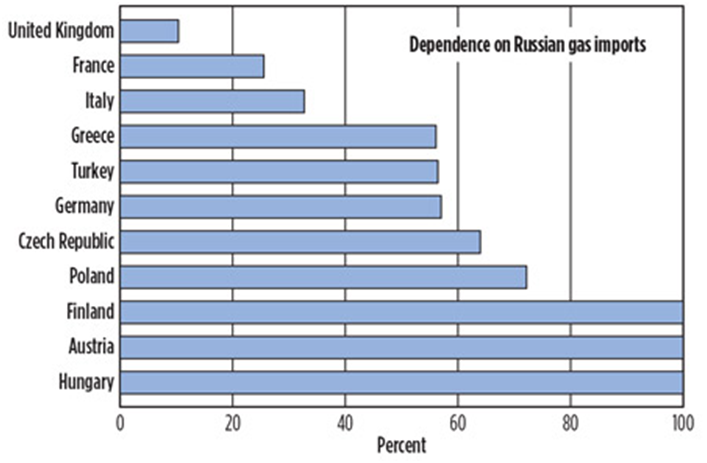

Prior to the Norsdstream pipelines the primary way that the pipeline routes used either partly diverged and crossed into Ukraine, or fully passed through the country. The Urengoi-Ujgorod being the highest in nominal capacity:
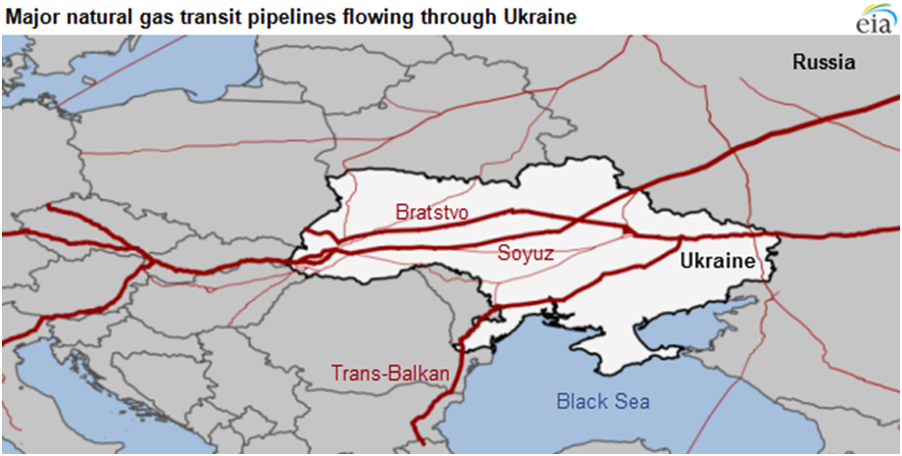
The demand in Europe for natural gas has been constantly growing, but domestic production begins to dwindle, as output from the North Sea by Norway and the Netherlands dwindle. Norway will be unable to sustain its production after the mid-2020‘s due to a lack of new projects and discoveries. That naturally increases imports into Europe, but the political situation always amplifies these issues. As places like North Africa are unstable, and countries like Libya being knocked out of any ability to provide even for itself thanks in part to American intervention of ousting former dictator Ghaddafi, Russian gas pipelines become ever more prevalent, and more importantly Ukraine itself becomes just as important as its role as a middleman between both East and West.
Ukraine since its inception after the fall of the Soviet Union has always been relevant to the natural gas situation for both Europe and Russia, which has made a pretty penny for itself in this position. Contact tariffs and transit fees are the main way the Ukrainian government benefits from this opportunity. Based on 2012 data, Ukraine was earning about $3 billion a year in transit fees. The amount of money gained context wise is important for a country that doesn’t even make over $50 billion in tax revenue. You factor this in with the 2014 coup backed by the Americans, and the outcome of the US putting itself and its assets both into the government and its energy sector you begin to see the political situation unfold. The Russians are dealing not only by that point sanctions but as well a nation hostile to them relationship-wise now having a large chunk of leverage over its energy-economy infrastructure. The Russians needed to find a more cost-effective way to bring a possibly equal amount of natural gas into Central Europe, so they went North. In most cases land pipelines tend to be more cost-competitive than underwater pipelines, but both the Russians and the Germans saw an opportunity in getting gas through without any middlemen.
Enter NordStream 2, a project since its inception had complaints from the Americans over Europe’s sovereign choice in business deals. And more importantly, it’s been at the epicenter of American interest in the crisis, with senators proposing and counter-proposing bills that all lead to the same thing: the sanctioning of the NS2 pipeline. Thankfully the Biden administration had pulled out any direct military presence within the country; however, they have maintained the same position that the main way they’re going to combat the Russians is with economic sanctions. Even the Trump administration had imposed sanctions on anyone that does business with Gazprom on the pipeline. And the construction simply isn’t a solo Russian job, plenty of German and central European partners with Gazprom are together on the project with the pipeline. The economic prospects for both sides are a no-brainer, as for the Russians supplying gas to Germany via through Ukraine would cost twice as much ($16.9 to $32.48-$45). For the Germans, it relieves them with a lot of headaches, as any way to gain access to Russian raw resources without the geographic trouble of Eastern Europe is an easy victory that doesn’t bog them down in a political great game along the Pale.
All the meanwhile, just as construction of NS2 completed just the winter of last year, American media and DC had pushed down the story of an imminent Russian invasion of Ukraine. First it was a “Christmas invasion”, onto an Olympics invasion, and now an invasion is due any day now. Clearly the State Department and US media are grasping at straws, but what’s the goal? Well fear mongering has worked in US interest before in Ukraine and was the main moral judge for the rest of the West to impose sanctions on Russia. The goal set in mind now is to cancel Nordstream 2 at any cost. Though in Europe by this point the propaganda has been a mixed bag. The Germans themselves have remained overtly skeptical about any serious incursion, and bounce back and force when pressed by the Americans regarding sanctioning NS2. In fact, in a survey Germans said when questioned if they viewed Russia as a threat, 82% had either said “no” or considered them as a “minor” threat. It’s even gotten to the point where the Ukrainian government now sees the US’s bluff on any aspect of an invasion. Also the French in usual fashion refuses to step in line with any NATO narrative that doesn’t involve bombing North Africa.
So, America tried to fear-monger Europe back into its sphere of influence and undermining its sovereignty again, yet it seems the writing is on the wall for a diplomatic resolution to what is essentially a non-issue for everyone that is not the US government. The farthest damage done is the extension of the certification to have gas pass through NS2 by this year. Yet the sunk cost of extracting funds from the Russian pipelines at exorbitant prices disincentivizing trade to Europe has fallen flat, with broadcasts of returns in transit fees for Ukraine dropping from $2.5 billion per year to $1.2 billion if NS2 began pumping gas through. As well the attempt to militarize anyone but the Baltics and Poles against Russia has fallen short. So, America must look elsewhere, and the carrot is now being provided with the stick - with the carrot in the form of Liquid Natural Gas (LNG).
Due to the limits of distance, possibility, and cost obviously not all gas can be transported via a pipeline. No Saudi pipeline exists that reaches to Beijing; however, gas can be transited along shipping lanes from port to port. The demand for LNG has been on the rise. In junction, LNG producers have been taking advantage of the opportunity to increase their exports to match the rising consumption. America itself is projected to become the largest exporter of LNG, with plant utilization jumping from 43% in 2020 to 98% in 2021. Seeing the economic opportunity and the political crisis, the Americans have taken full advantage of the situation.
With NS2 essentially being pushed back by the stoking the fears of a Russian invasion and Russians responding with constraining gas exports as one of their few political maneuvers, the Americans began exporting LNG to Europe, and in large quantities. Its even gotten to the point where the Europeans are running out of capacity to hold all the cargo. And according to the Wallstreet Journal, out of the five dozen US tankers out on sea, more than two-thirds are on track towards European terminals.
It would seem clear cut enough, America providing an alternative to Russia as a source of energy, however not everything is as easy as simply putting a tanker in port. In majority case for the process of non-pipeline gas to reach a country, the most expensive part of the process is liquification, but in terms of cost, shipping American LNG to Europe is simply not a lucrative deal for the importers. In total, the cost of taking in American LNG is completely uncompetitive compared to Europe’s closer alternatives:
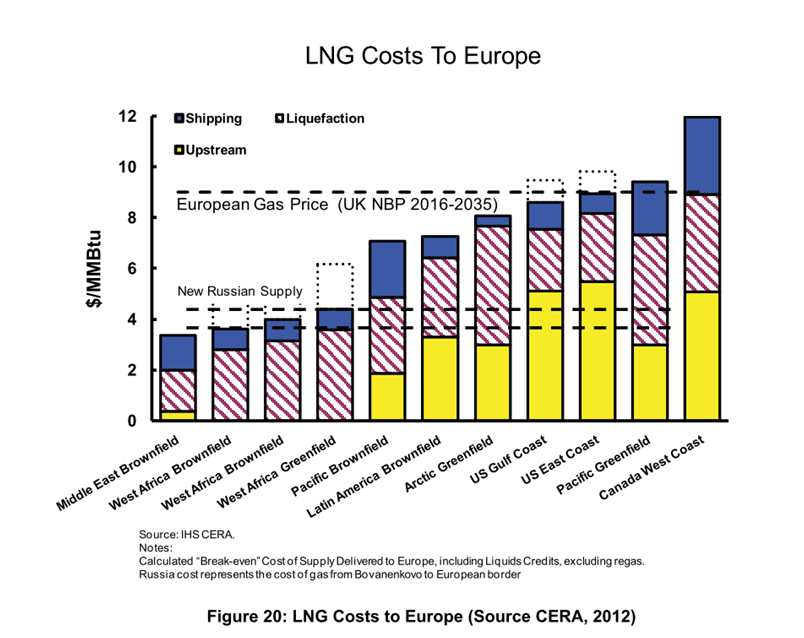
The cost vs returns issue is still as prevalent in 2012 as it is in 2018. As it stands now the surplus of active tankers in the Atlantic, with companies taking advantage at the hike in prices and demand, have caused the freight rates to drop into the negative. Even in places like Northwestern Europe the cost is simply too high compared to Russian gas to be considered a smart trade-off:
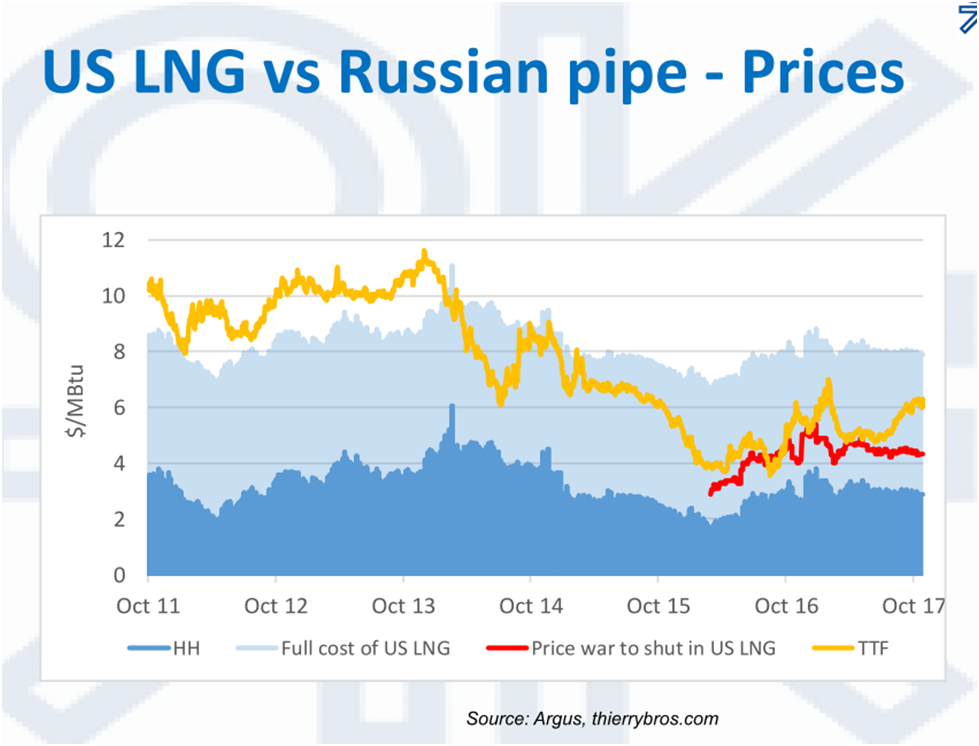
(TTF is Dutch market price for natural gas, HH is US Gulf market price)
This itself doesn’t even consider in the logistic and infrastructure limits of the ordeal, as Germany lacks its own domestic terminal for LNG. From the context of the political situation, it seems the story unfolds a vice-versa on American vs Russian interest in Europe, as America forces the Europeans to become more reliant and economically suppressed by dependency on US natural gas.
Despite the offers and American tankers entering Europe this is not America’s only card to play. As the long history of intervention and involvement in Middle Eastern affairs, the Biden administration has called upon their sphere in the Gulf States as nations like Qatar to divert gas to Europe. Qatar itself has been a long-time major LNG producer in the world, and has been one of the more major players prior to the events in Ukraine as an exporter to Europe’s markets:
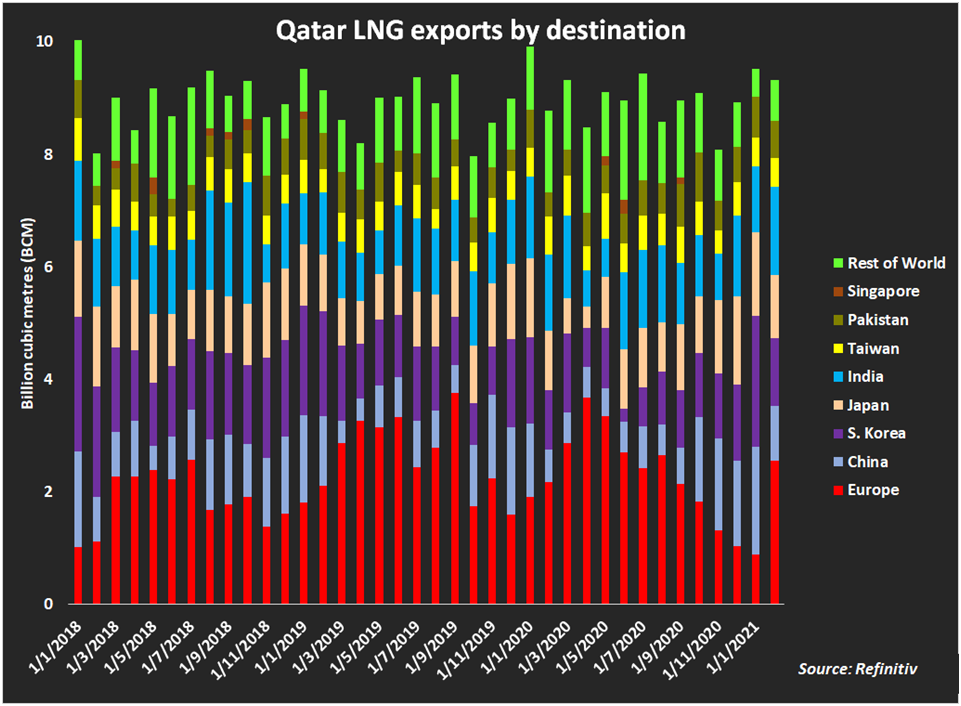
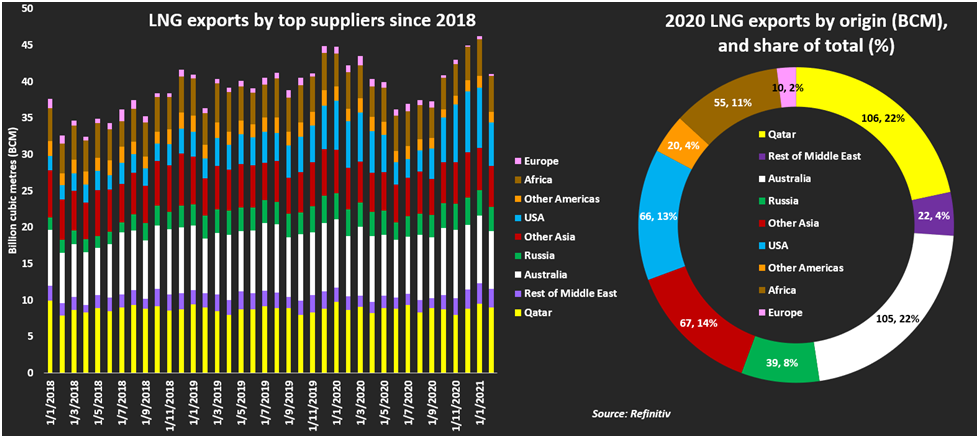
In general, US LNG isn’t economical for Europeans to import, however, Qatari and Gulf States LNG is. With news publications like Forbes touting Qatar as Europe’s possible savior, it would seem like the next obvious choice for the Europeans to choose. However, if this article has proven anything, the geopolitical situation in the region muddies things, and in this case sways the situation in America’s favor.
The Implications of Current Events
The case of European reliance on Arab gas means one major condition, security for these states in both the Gulf and the Red Sea must be maintained. Europe for the longest time has waining interest on America’s “forever wars”. Another major point of contention are the views on Iran as major foe, resulting now in America’s main interest in the region being hegemony in the Strait of Hormuz. European reinvolvement in Middle Eastern security would force them into the same camp with the Americans and the Arab states on Iran. Along with this, the Bab el-Mandeb Strait becomes ever more important to American interest and European interest, as any tanker from Qatar must pass through that prior to reaching the Suez. Consequentially Yemen becomes an major theater for those involved to reinstate Saudi hegemony in the country, as the Port of Aden is the most important deep seaport in the region. The port of Aden as it stands right now is in control of the pro-Saudi/UAE faction in Yemen fighting against the Houthis, which the Saudis are in a war with consistently bombing civilian population centers. This newfound importance in the region would explain the Biden administration’s strange shift on policy regarding the Houthis. There have already been numerous talks in D.C about redesignating the Houthis as terrorists.
To sum up the situation it’s another attempt to undermine German and Central European’s sovereign interest in economic ventures. With the possibility of the Ukrainians being another non-important Eastern European country along the Pale no longer being able to constrain German and Russian market integration, the US is stoking the fears of a war to undermine this prospect. America itself has managed to use the finger in every pie strategy their advantage in all regions of the globe: As the US attempts to isolate Russia more into China’s camp justifying the great powers game for perpetual buildup of MIC, the return of European dependency on Middle Eastern states and the reignited interest in their security concerns, and the perpetual attempt of America to undermine Europe just as it had done in 1917 and in 1942.

Comments